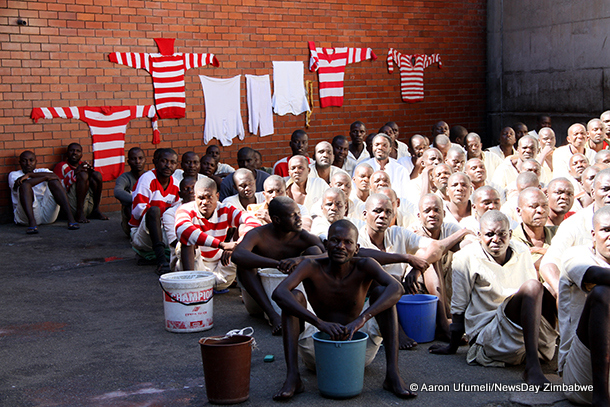
DISCLOSURES that conditions in Zimbabwe’s overcrowded prisons are so bad that they violate prisoners’ constitutional rights should push government to reduce its prison population as a matter of urgency, and conform to the Sadc minimum standards for good prison health.
NewsDay Comment

For years, the poor conditions have persisted in prisons and health has remained one of the biggest challenges.
At a media briefing convened by SAfAids on domesticating Sadc minimum standards for good prison health, prison officials described a prison system that has failed to deliver minimal care to prisoners with serious medical and mental health problems and produced needless suffering and death.
The prison officials lamented overcrowding in correctional facilities for, among other things, fuelling sexual violence and posing a serious public health problem.
Zimbabwe Prisons and Correctional Services (ZPCS) deputy director for health Assistant Commissioner Alfrod Dube reportedly said overcrowding was being worsened by lack of isolation facilities.
As it stands, isolation facilities, which are critical when handling prisoners with infectious diseases, are not available, hampering progress of ensuring good health strategies in prisons are followed.
It appears the problem of overcrowding in prisons is not being taken seriously, as most inmates are suffering from food shortages and sexual abuse, among other ills. Of course, no one would want to be seen as coddling criminals, but due to overcrowding, correctional facilities have ended up being hellholes of human suffering.
- Chamisa under fire over US$120K donation
- Mavhunga puts DeMbare into Chibuku quarterfinals
- Pension funds bet on Cabora Bassa oilfields
- Councils defy govt fire tender directive
Keep Reading
Reports that some prisoners end up offering sex for protection or small luxuries like cigarettes, while many are being forced into the acts, are shocking. Does the government have the ability to protect inmates from sexual assault and physical abuse? It’s an emphatic no, as overcrowding itself is depriving people of basic services like medical care. All these things make the most marginalised, most vulnerable people in society that much more vulnerable.
One wonders why the government is gambling with the safety of people. Prisoners have rights, basic needs like shelter and access to basic medical care, hence government must meet their human rights.
Although government does not recognise issues of men having sex with men, which is actually a crime, Dube said ZPCS encouraged inmates to use condoms when they are released to stem the spread of HIV and Aids.
So, of utmost importance is passing legislation that will look into issues of men who have sex with men and intravenous drug users.
A 2014 study by the Zimbabwe Lawyers for Human Rights and the Law Society of Zimbabwe on pre-trial detention in Zimbabwe found that the number of pre-trial detainees was high — approximately 30% of the total prison population — due to inefficiencies in the country’s justice delivery system.
Clearly, a prison system that deprives prisoners of basic sustenance, including adequate medical care, is incompatible with the concept of human dignity and has no place in civilised society.
It appears the majority opinion in the discussion could be an example of the problem of courts’ overstepping their constitutional authority and institutional expertise in issuing “structural injunctions” in “institutional-reform litigation” rather than addressing legal violations one-by-one.











